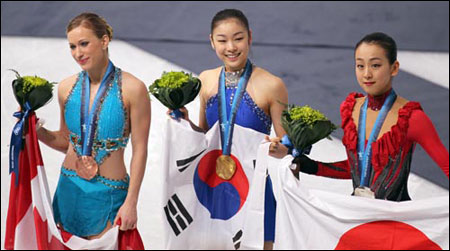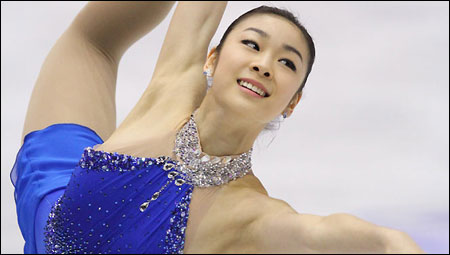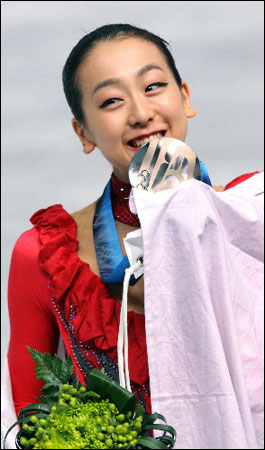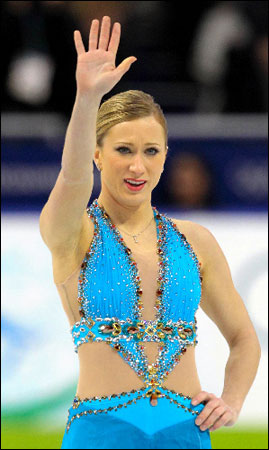Ever since I can remember, ladies’ figure skating has been my favorite event to watch in the Winter Olympics. I remember being glued to the television when Kristi Yamaguchi and Midori Ito won medals at the 1992 Albertville Olympics in France, and just being so enamored with those women and the magic they worked on the ice. Kristi Yamaguchi became my childhood idol, and I still get excited whenever I see her come on television. (I secretly hope that I will someday run into her, since she lives in the Bay Area.) Since then, I’ve watched the likes of Tara Lipinski, Michelle Kwan, Sasha Cohen and Shizuka Arakawa skate towards their medal dreams at the Winter Games.
This past Tuesday and Thursday were the short program and free skate for the ladies’ figure skating this Olympics, and they were the most exhilarating programs that I’ve seen in years! The ladies who competed this year were among some of the best figure skaters I have ever seen, and each one sparkled in their own way on the ice.

Kim Yu-na delivered a beautiful, groundbreaking performance to answer the world’s expectations of her to come out on top, setting world records in scores for both the short program and free skate, and winning South Korea’s first ever figure skating medal. Japan’s Mao Asada made history as well, surpassing her idol Midori Ito to become the first woman to ever successfully land two triple axels in routine, three total triple axels in a competition. And Canadian figure skater Joannie Rochette brought the world to tears as she skated with such beauty and strength, only days after losing her mother to a heart attack. I’m a huge fan of all three of these ladies, and just watching them perform was such an emotional rollercoaster for me and each of them brought tears to my eyes.

Kim Yu-na, of course, was the heavy favorite for the gold, and was shouldering such immense pressure not only from her own country but from the world. As the current reigning World Champion, everyone kept saying that the gold medal was hers to lose. I can’t even imagine how difficult it must be to face pressure of such humongous proportions at only 19 years old. But in this competition, she didn’t falter even once in her programs, and she skated flawlessly to the gold. Her skating is so breezy and light, with such fast jumps that she almost makes it look easy. Akiko Wada even commented on a Japanese television show, “When you watch Kim Yu-na skate, you can watch her at ease because she is just that smooth… you don’t expect her to make any mistakes.” Her performances were truly legendary this time, and her scores reflected it. Although I have always been a fan of Yu-na’s skating skills, one thing that always bothered me a little was that she is so hard to read — she always seemed so calm and collected, which is a mark of a professional, but the emotions of these athletes are what usually really draws me in. Upon completing her long program, though, with the realization that she’d pretty much nailed the gold, Yu-na showed a much more human side than I’d ever seen before, shedding tears that turned into sobs as she skated across the rink. It was the first time I’d seen her show so much emotion, and it really moved me and immediately lodged a huge lump in my throat. How much relief and joy she must have felt in that moment, to finally have that pressure lifted from her shoulders and be rewarded for the years of effort and training to make history for her country.

Japan had three skaters in the competition this time, but the obvious favorite of the nation was young Mao Asada, also 19 years old. She’s been the sweetheart of Japan’s figure skating for years now. Doe-eyed and possessing an adorable smile and cheery personality that can light up an entire room, she is balanced, humble, and scandal-free — everything Japan could want of a star athlete. In 2006, she √ǬÝwas just short of the cut-off age for the Torino Olympics, but was already considered one of the greatest skaters in the world, having landed her first triple axel at age twelve and winning everything on the Junior level. She went on to become the 2008 World Champion, and although she has been a little shaky this past season, she had just won the 2010 Four Continents Figure Skating Championships in January. There have been only five women in figure skating history who have been able to successfully complete a triple axel in international competition, three of them Japanese, and Mao is one of them. I admit that I have a soft spot for Mao, since I have been watching her skating since she was a teen, and I have anticipated her doing well at the Olympics since four years ago. She too was under a lot of pressure from being Japan’s favorite in figure skating, although probably not as much as what Yu-na was facing. I personally thought she skated most elegantly in the short program and she was able to nail her triple axel, but Yu-na got more speed and height in her jumps comparatively. I noticed that Mao’s routines have gotten a lot darker and more heavy-drama since she began training under her Russian coach Tatiana Tarasova — gone are the days when she used to skate to lighter melodies like Chopin and Claire de Lune (I kind of miss those days!). For her free skate, she skated to Bells of Moscow, and the routine was so intense, it felt like she was going to set the ice on fire. She had to go on right after Yu-na delivered her golden performance, and although she says in interviews that she hadn’t heard the scores due to the loud cheering, it still must have been unnerving to perform in the wake of all the cheers being showered upon her biggest rival. So I was that much more impressed when she was able to solidly land her triple axels early in her program — the courage and power with which she executed them made tears spring to my eyes (especially since I’d already had that lump in my throat thanks to Yu-na’s tears). But in the middle of the program, she faltered and missed the takeoff on a jump and what was supposed to a triple ended up being only a single — the mistake was costly, and put her significantly behind Yu-na in her score, putting her in second place to win the silver medal.

Joannie Rochette of Canada performed extraordinarily well considering the circumstances of her mother’s unexpected death due to a heart attack only a couple days before the short program. Her mother had been her best friend and biggest support, and despite the deep sorrow she must have felt at such a huge loss, Joannie still went onto perform because she knew that that was what her mother would have wanted her to do. The fortitude and bravery with which Joannie went forth with her performance was incredible and brought the whole stadium to their feet to applaud her. Both nights, her skating was amazingly clean for one who must have been suffering so much internally, and both nights, her performances were the ones that really brought on the waterworks for me. (There probably wasn’t a a dry eye in Pacific Coliseum, either.) √ǬÝShe is truly a trooper, and brought so much inspiration to everyone watched her.
I was also pleasantly surprised by how strong Mirai Nagasu of the U.S. team performed. On Thursday, she was the last to perform after so many groundbreaking performances, and she still did it with such grace and gusto. She didn’t win a medal this year, but there’s no doubt that she has talent. I didn’t know too much about Mirai before this Olympics, but she definitely left an impression and I’m sure I’m not alone when I say that I’m looking forward to seeing her return to the Olympic stage in 2014. She may just be the next Kristi Yamaguchi. (I love seeing Japanese Americans represent!)
The medal ceremony was loaded with emotion as well. Yu-na tearfully accepted the first gold in the sport for her country with a shy smile — what a great moment for South Korea, and for Yu-na, to top her own world records and to achieve that validation. Joannie also had tears in her eyes as she made √ǬÝher way to the podium in her home country, and I’m sure her mother was smiling down on her with so much pride. It was difficult to watch Mao at the ceremony, because you could tell she was really holding back her tears. I was hoping that she’d have her usual 100 watt smile on her face as she accepted her silver, but she looked stoic, trying hard to smile while choking back tears of disappointment. Like all figure skaters, she’s always dreamed of winning the gold, and that is what she had really wanted to do as she came to Vancouver this year. But more than that, she was frustrated that she had been unable to skate a program free of mistakes. Yu-na’s performance was just unbeatable, and it’s pretty questionable that Mao would have been able to top her score even if she had not made those two mistakes on Thursday. The emotions really surfaced and the tears just spilled over as she was interviewed by the Japanese media immediately following the ceremony:
Mao is very hard on herself here, repeatedly commenting on her feelings of regret. She says that the long program felt long and at the same time was over before she knew it. She says that she was very unsatisfied with her performance and that she is very disappointed in herself with the mistakes she made. When asked about her triple axels, she just answers that she is glad that she was able to complete them successfully, but that they were the only good thing about her program. This clip was shown live in Japan, and I’m sure I’m not alone when I say that I cried with Mao at her heartbreak and disappointment. Mao is a perfectionist and she had been dreaming of an Olympic gold since seeing Lipinski win back in 1998’s Nagano Olympics. How frustrating it must have felt to not be able to skate a clean program that she could be satisfied with after four years of training for the Olympics. I just wished I could tell her that she still skated great, and although it wasn’t enough to earn her the gold, that silver is still a huge honor that she should be proud of.
The poor girl had to do live broadcast interviews to Japan until 4am despite her exhaustion and fatigue, but Mao’s emotions seem to stabilize as the night goes on and she seems to be more collected and in higher spirits as Tokyo’s anchorwoman Ando interviews her. Ando really spoke for all of Japan when she told Mao that she and everyone back in Japan was immensely proud of her winning the silver for her country and that her performance brought them to tears.
Mao’s older sister Mai is also a figure skater and although she has not enjoyed nearly as much success as Mao and has since gone professional, she had been the inspiration for Mao to switch from ballet to skating at age 5. Mai surprised Mao as she came on during an interview, and Mao can’t help but shed tears as she’s reunited with her sister for the first time in Vancouver.
Mai expresses how proud she is of her baby sister, and reads a letter from their mother which again moves Mao to tears. Her mother writes that reflecting back on the years when Mao first started skating when Mao would frequently cry when she didn’t do well in competitions as a little girl, she feels that it is really an amazing miracle that Mao was able to place second on a huge world stage such as the Olympics. She expresses that she is full of gratitude for everyone who has supported Mao along this journey, and congratulates her daughter for doing so well. Mao had said that the first person she wanted to show her medal to and express her joy to was her mother, so she must have been so happy to hear from her back in Japan.
In a press conference on Friday, the day after the competition, Mao looked much happier after a night’s rest, as she spoke to the media with Miki Ando and Akiko Suzuki who also represented Japan this time. Mao stated that during the medal ceremony, she was still having difficulty sorting out her emotions and her disappointment and regret weighed heavily on her, but that now she is very honored and happy to have won the silver. She said that she couldn’t wait to return to Japan to show her medal to everyone, and to have people touch it. Asked about Kim Yu-na, she said that she thinks she is a great skater that she really respects, who inspires and motivates her.
Japan’s Prime Minister Yukio Hatoyama even issued a statement, saying “Given that Kim Yu-na’s performance was extraordinarily strong and outstanding, I would like to congratulate Asada Mao on her silver medal. The whole country is celebrating your achievement, and I would like to sincerely congratulate you.” At the same time, regarding the overall ladies’ figure skating this year, he commented, “I would like to offer congratulations on South Korea’s inspiring, historical achievement. It is really wonderful that both South Korea and Japan were able to bring so much excitement to the Olympic event this year. It is important to be able to compete like this on the world stage.” I had noticed that NBC and other media outlets had repeatedly mentioned the historical animosity between Korea and Japan, saying that “any defeat of Japan would be memorable for the Koreans,” and I am sure it probably is for many, given the history between the two countries. But I think sportsmanship and mutual respect are always the best way to move forward in healthy competition, and I am happy to see the humility and class with which Hatoyama delivered his congratulatory remarks to Yu-na and South Korea. Despite what some may think, although Mao is obviously the country favorite, Yu-na has a huge fan base in Japan as well, and many Japanese (like myself) are genuinely happy for her victory. Japanese citizens seem to be more overjoyed by Mao’s silver than disappointed that she didn’t win the gold, so if letting her country down was one of her fears, Mao has absolutely nothing to worry about — Japan is more than ready to welcome her back home with wide open arms. üôÇ
It has been a truly historical couple days to watch in ladies’ figure skating history, and I was so inspired and moved by every moment of that jaw-dropping last hour. It has been exciting to witness so many moments that will make Olympic history. I can’t wait for these stars to take on the ice again in their exhibition gala tonight, and I am excited to see how they will continue to move forward in their skating careers. As the Winter Games draws to a close this weekend, I can truly say that the Vancouver 2010 Olympics has been beyond memorable!